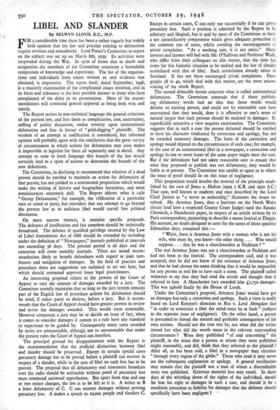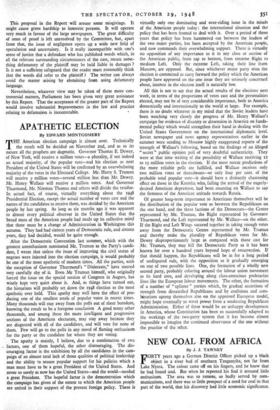LIBEL AND SLANDER
By SELWYN LLOYD, KC., M.P.
FOR a considerable time there has been a rather vaguely but widely held opinion that the law and practice relating to defamation require revision and amendment. Lord Porter's Committee to report on the subject was set up on March 8th, 1939. Its activities were suspended during the War. In spite of losses due to death and resignation the members of the Committee constitute a formidable symposium of knowledge and experience. The list of the 'organisa- tions and individuals from whom written or oral evidence was obtained, is impressive. The report itself, dated September, 1948, is a masterly examination of the complicated issues involved, and in its form and substance is the best possible answer to those who have complained of the delay in its presentation. Most of the recom- mendations will command general approval as being both wise and timely.
The Report recites in non-technical language the general criticisms of the present law, and lists them as complication, cost, uncertainty, stifling of public discussion, undue severity upon unintentional defamation and bias in favour of " gold-digging " plaintiffs. The wisdom of an attempt at codification is considered, but informed opinion will probably agree with the conclusion that the great variety of circumstances in which actions for defamation may arise makes it impossible to legislate for them all separately and in detail. Any attempt to state in fresh language this branch of the law wou:d certainly lead to a spate of actions to determine the bounds of the new definitions.
The Committee, in declining to recommend that relatives of a dead person should be entitled to maintain an action for defamation of that person, has not yielded to a sentimental proposition which would make the writing of history and biographies hazardous, and most reminiscences extremely dull. The Report abhors what it calls "Group Defamation," for example, the vilification of a particular race or creed or party, but considers that any attempt to go beyond the present law as to seditious libel would curtail free political discussion.
On more narrow matters, it contains specific proposals. The defences of justification and fair comalent should be technically broadened. The defence of qualified privilege created by the Law of Libel Amendment Act of 1888 should be extended by including under the definition of "Newspapers," journals published at intervals not exceeding 36 days. The present period is 26 days and the extension will cover monthly journals. There are sound recom- mendations likely to benefit defendants with regard to joint tort- feasors and mitigation of damages. In the field of practice and procedure there are suggestions too technical to set out here, but which should command approval from legal practitioners.
An interesting proposal relates to the powers of the Court of -Appeal to vary the amount of damages awarded by a jury. The Committee soundly maintains that so long as the jury system remains part of the English law of procedure actions for defamation should be tried, if either party so desires, before a jury. But it recom- mends that the Court of Appeal should have greater powers to review and revise the damages awarded. This would seem reasonable. However competent a jury may be to decide an issue of fact, when it comes to consider damages it cannot as a rule have any standard or experience to be guided by. Consequently many sums awarded by juries are unreasonable, although not so unreasonable that under the present rules the Court of Appeal can interfere.
The principal ground for disappointment with the Report is the reconunendation that the artificial distinction between libel and slander should be preserved. Except in Certain special cases pecuniary damage has to be proved before a plaintiff can recover in respect of a slander, while in the case of libel no such loss has to be proved. The proposal that all defamatory oral statements broadcast over the radio should be actionable without proof of pecuniary loss must command universal approbation. But apart from that and one or two minor changes, the law is to be left as it is. A writes to B a letter defamatory of C. C can recover damages without proving pecuniary loss. A makes a speech to io,000 people and slanders C.
Except in certain cases, C can only sue successfully if he can prove pecuniary loss. Such a position is admitted by the Report to be arbitrary and illogical, but is said by most of the Committee to form a not unsatisfactory compromise which gives adequate protection in the common run of cases, whilst avoiding the encouragement of trivial cOmplaints. "As a working rule, it is not amiss." Many lawyers and laymen will feel with Mr. O'Sullivan and Professor Wade, who differ from their colleagues on this matter, that the time has come for this fantastic situation to be tackled and the law of slander assimilated with that of libel. Such assimilation already exists in Scotland. It has not there encouraged trivial complaints. Para- graphs 38 to 40, which deal with this matter, are the most uncon- vincing of the whole Report.
The second debatable matter concerns what is called unintentional defamation. The Committee contends that if those publish- ing defamatory words had no idea that those words would defame an existing person, and could not by reasonable care have ascertained that they would, then it is offensive to one's sense of natural justice that such persons should be mulcted in damages. So superficially attractive a view requires examination. The Committee suggests that in such a case the person defamed should be entitled to have his character vindicated by correction and apology, but not be awarded monetary damages. The form of the correction and apology would depend on the circumstances of each case; for example, in the case of an unintentional libel in a newspaper, a correction and apology in one or more issues of the same paper might meet the case. But if the defendants had not taken reasonable care to ensure that what they proposed to publish was not defamatory, they would be liable as at present. The Committee was unable to agree as to where the onus of proof should lie on this issue of negligence.
This proposition would involve the reversal of the principle estab- lished by the case of Jones v. Hulton (1909 2 K.B. and 1910 A.C.) That case, well known to students and once described by the Lord Chief Justice as "a terror to authorship," illustrates the issues in- volved. Mr. Artemus Jones, then a barrister on the North Wales circuit (and later a respected County Court Judge) sued the Sunday Chronicle, a Manchester paper, in respect of an article written by its Paris correspondent, purporting to describe a motor festival at Dieppe. His account, no doubt designed to cater for the tastes of those spacious Edwardian days, contained this
"Whist, there is Artemus Jones with a woman who is not his wife, who must be, you know—the other thing. ... Who would suppose. . . that he was a churchwarden at Peckham ? "
The real Artemus Jones was not a churchwarden at Peckham and had not been to the festival. The correspondent said, and it was accepted, that he did not know of the existence of Artemus Jones, and that he had chosen the name thinking that it would be impossible for any person in real life to have such a name. The plaintiff called witnesses to say that they had read the article and thought that it referred to him. A Manchester jury awarded him £1,750 damages. This was upheld finally by the House of Lords.
Under the Committee's proposal, Artemus Jones would have got no damages but only a correction and apology. Such a view is really based on Lord Kenyon's direction in Rex v. Lord Abingdon that "in order to constitute a libel the mind must be at fault" (subject to the separate issue of negligence). On the other hand, a person is presumed to intend the natural and probable consequences of his own actions. Should not the true test be, not what did the writer intend but what did the words mean in the relevant surrounding circumstances ? Were they published "of and concerning" the plaintiff, in the sense that a person to whom they were published might reasonably, and did, think that they referred to the plaintiff ? After all, as has been said, a libel in a newspaper may circulate "through every region of the globe." Those who read it may never see the subsequent explanation or apology. A general recollection may remain that the plaintiff was a man of whom a discreditable story was published. Grievous material loss may result. In these days of the whittling down of the rights of the individual, should he lose his right to damages in such a case, and should it be a condition precedent to liability for damages that the defamer should specifically have been negligent ? '
This proposal in the Report will arouse some misgivings. It might cause grave hardship to innocent persons. It will operate very much in favour of the large newspapers. The great difficulty of onus of proof is left unresolved by the Committee, but, apart from that, the issue of negligence opens up a wide new field of speculation and uncertainty. Is it really incompatible with one's sense of justice that a defendant who has published words which, in all the relevant surrounding circumstances of the case, meant some- thing defamatory of the plaintiff may be held liable in damages ? Is it not a sufficient safeguard that the reader must reasonably think that the words did refer to the plaintiff ? The writer can always avoid the matter arising by abstaining from using defamatory language.
Nevertheiess, whatever view may be taken of these more con- troversial matters, Parliament has been given very great assistance by this Report. That the acceptance of the greater part of the Report would involve substantial improvements in the law and practice relating to defamation is incontestable.



































 Previous page
Previous page